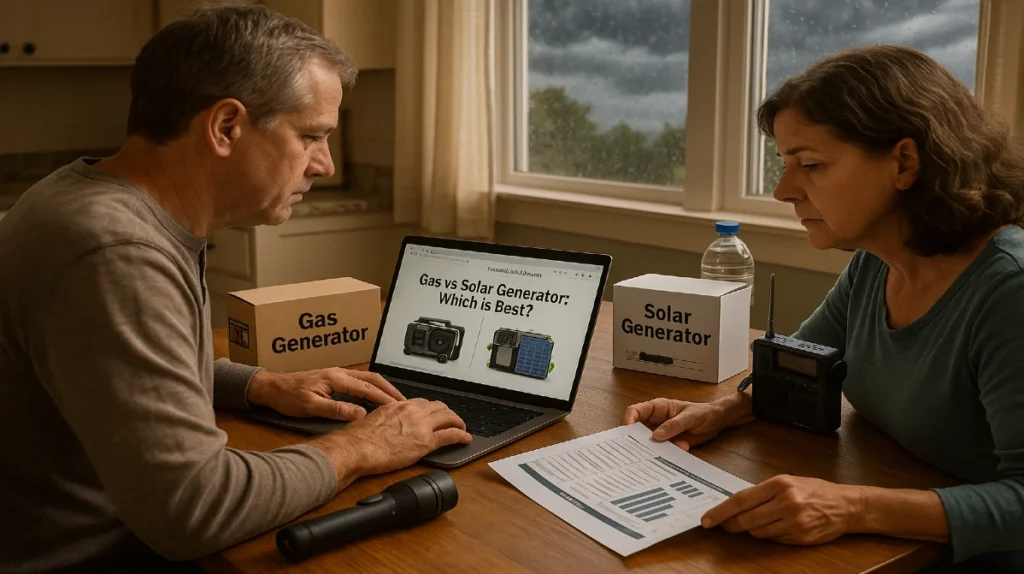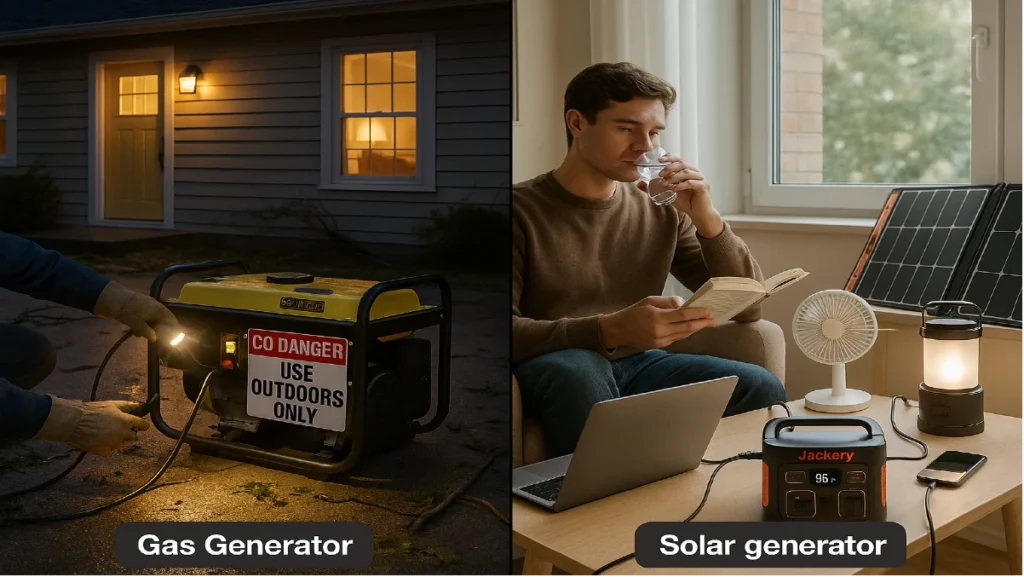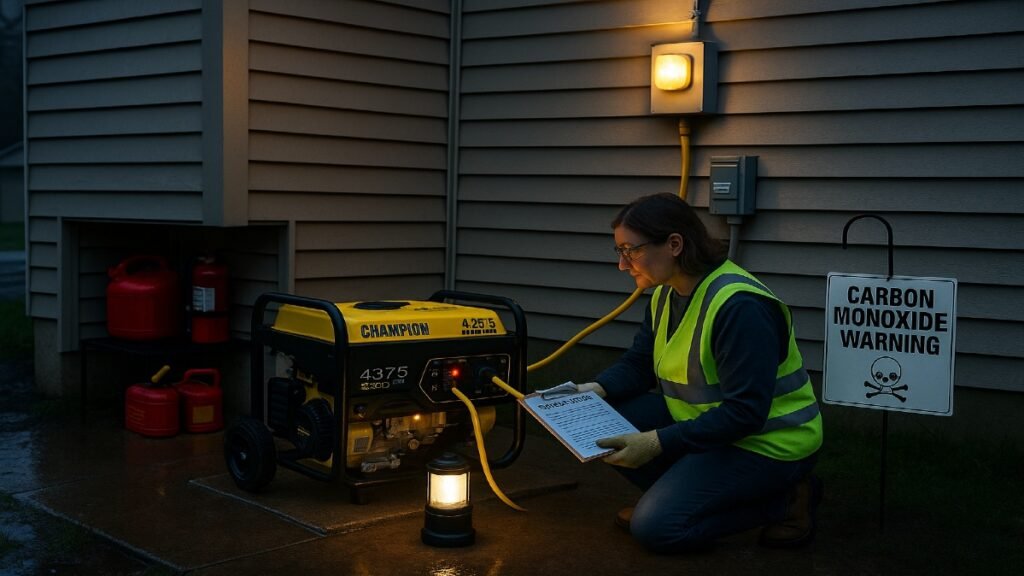
Power outages aren’t just inconvenient they’re stressful, disruptive, and even dangerous. Whether it’s a hurricane barreling down or an ice storm knocking out the grid, being unprepared can leave your family vulnerable. That’s why more homeowners are asking: Should I get a gas or solar generator?
If you’ve been staring at generator options and wondering what’s safe, affordable, or even usable during a real emergency this guide is for you. We’ll walk through the real differences, unexpected deal-breakers, and smart strategies to choose the best backup for your home.
Choosing the right gas or solar generator can make all the difference when the grid goes down.
By the end, you’ll know exactly which option fits your home, budget, and lifestyle and how to get ready before the next blackout strikes.
Need a full blackout prep plan? Visit our Power Outage Guide.
Why Choosing the Right Generator Matters
Imagine this: the lights flicker, the fridge clicks off, and your family huddles by flashlight wondering how long the outage will last. The storm passed, but the power could be gone for hours or days.
That’s when it hits you. Did you choose the right generator?
The stakes aren’t just about comfort they’re about keeping food cold, devices charged, and medical devices running. For some, it’s literally life and death. And for many families, the wrong generator isn’t just useless it could be dangerous.
Whether you live in a hurricane zone, face winter outages, or want to be ready for the unexpected, understanding the difference between gas and solar generators will help you make a smart, storm-ready decision.
Want to see all your power backup options? Visit our Backup Power Hub.
Gas or Solar Generator: Quick Comparison Guide
Here’s a quick side-by-side look at how gas and solar generators stack up for storm and blackout readiness:
| Feature | Gas Generator | Solar Generator |
|---|---|---|
| Power Output | High (can run whole-home systems) | Moderate (ideal for essentials like fridge, phones) |
| Fuel Source | Gasoline or propane (must be stored) | Sunlight or wall charging (no fuel needed) |
| Noise Level | Loud (engine noise) | Silent (fan hum only) |
| Indoor Use | No — requires outdoor ventilation | Yes — safe for indoor use |
| Maintenance | High (oil changes, fuel stabilizer) | Low (battery care only) |
| Run Time | As long as fuel lasts | Limited to battery + sunlight recharge |
| Best For | High-power needs, rural homes | Urban settings, indoor use, ease of use |
Summary: If you need whole-house power and don’t mind storing fuel, gas wins. If you need clean, quiet indoor power for essentials, solar may be your better bet.
Pros and Cons of Gas Generators
Gas-powered generators are what most people picture when they think of backup power. They’re widely available, relatively affordable, and come in sizes from portable to whole-home models. But that power comes with trade-offs you’ll want to consider carefully.
✅ Pros of Gas Generators
- High Power Output: Easily runs large appliances, HVAC units, and even full household circuits when properly wired.
- Readily Available: Sold at hardware stores, online retailers, and most home improvement chains.
- Extended Runtime: Can run for hours at a time with continuous refueling.
- Lower Upfront Cost: Entry-level gas generators are typically cheaper than solar counterparts of similar wattage.
❌ Cons of Gas Generators
- Requires Fuel: Needs gasoline or propane, which must be stored safely and may be hard to find during major outages.
- Carbon Monoxide Risk: Must be used outdoors only to avoid deadly fumes. Improper use indoors is extremely dangerous.
- Noisy Operation: Most units are loud, making them impractical for quiet neighborhoods or apartment use.
- High Maintenance: Regular oil changes, engine checks, and proper fuel storage are all required to keep them working.
In short, gas generators are powerful and reliable, but they come with real risks and responsibilities. They’re best suited for homeowners who can safely store fuel and operate them outdoors away from windows or vents.
Pros and Cons of Solar Generators
Solar generators have surged in popularity, especially with families looking for cleaner, quieter, and safer backup power. These devices store energy in high-capacity batteries that can be recharged by wall outlets or portable solar panels. But are they powerful enough when the grid goes down?
✅ Pros of Solar Generators
- Safe for Indoor Use: No fumes, no combustion, and no ventilation needed. Completely safe for apartments, bedrooms, or basements.
- Whisper Quiet: Operates silently with only a fan hum, perfect for night use or noise-sensitive homes.
- Low Maintenance: No oil, no fuel stabilizer, and minimal upkeep needed. Just keep the battery charged and clean.
- Eco-Friendly: Runs on renewable solar power with zero emissions. Great for green-conscious households.
❌ Cons of Solar Generators
- Lower Power Capacity: Often limited to smaller loads like fridges, lights, fans, and electronics.
- Charging Time: Can take hours to recharge via solar, especially during cloudy conditions or winter.
- Higher Upfront Cost: Quality units with decent battery life and wattage can be significantly more expensive than gas models.
- Not Ideal for All Appliances: Struggles with heavy-load devices like sump pumps, window AC units, or microwaves.
Solar generators are excellent for essential indoor backup, especially during short-term outages or for users who prioritize safety and simplicity. They’re also a smart choice if you want to avoid dealing with fuel altogether.
Gas or Solar Generator: Cost, Maintenance, and Safety
Choosing a generator isn’t just about wattage. The long-term cost of ownership, daily usability, and safety profile all matter—especially during emergencies when stress levels are already high. Let’s break down what it really takes to own and operate a gas or solar generator.
💵 Upfront Cost
- Gas Generators: Entry-level models can start around $300 to $600. Larger units for whole-house use may cost $1,000 or more.
- Solar Generators: Basic models with limited capacity start around $500, while mid-tier units (suitable for fridge, lights, and phone charging) often run $900 to $2,000. Add $200 to $800 for solar panels if not included.
🔧 Maintenance Requirements
- Gas: Requires regular oil changes, engine tune-ups, fuel stabilizer if stored long term, and occasional filter replacement.
- Solar: Virtually maintenance-free. Just keep the battery charged and the solar panel surfaces clean if used.
⚠️ Safety Considerations
- Gas: Never operate indoors due to carbon monoxide. Store fuel safely in ventilated areas. Improper use can be deadly.
- Solar: No fumes, no combustion, and zero risk of gas leaks. Safe for use in bedrooms, living rooms, and apartments.
Bottom line: Gas generators may be cheaper upfront but require more attention and carry serious safety concerns. Solar generators are safer, quieter, and simpler but come with a higher initial investment.
Which Gas or Solar Generator Works Best in a Blackout?

Still unsure which way to go? Let’s explore a few blackout scenarios to help you decide which generator type fits your lifestyle, home layout, and risk profile.
🏠 Suburban Home, Extended Power Outage (2–5 days)
If you need to run a full fridge, freezer, microwave, and maybe a window AC unit, a gas generator will provide the wattage and runtime you need. Just make sure it’s ventilated properly and fuel is safely stored.
For this type of home, a gas or solar generator decision comes down to how much power you truly need over multiple days.
🏢 Small Apartment or Townhome (Short Outage)
A solar generator is ideal here. No fumes, no noise, and it can charge phones, power a CPAP machine, or keep a mini fridge running. It’s safe to use indoors and easy to transport.
🚗 On the Go (Evacuation or Car Camping)
Solar wins again. It’s portable, quiet, and doesn’t require messy fuel. Many models charge in the car or via solar, making them perfect for bug-out bags or road trips.
💡 Want Both?
Some households use both types. A gas generator for high-power needs and a solar one for overnight use indoors. It’s a balanced approach for
Recommended Generators (Gas & Solar)
Choosing the right model doesn’t have to be overwhelming. Below are two trusted picks—one gas, one solar—that strike a great balance between price, performance, and reliability for most storm-prone homes.
🔥 Top Gas Generator Pick
Champion 4375/3500-Watt Portable Generator
- Powerful enough for fridge, freezer, lights, and sump pump
- Runs on gasoline with 12-hour runtime at 50% load
- Includes surge protector, volt guard, and cold-start technology
- Use outdoors only with safe ventilation
- Operate your 3500-watt portable generator right out of the box on either gasoline or propane, plus features CO Shield ca…
- Includes a 120V 30A (TT-30R) RV outlet, a 120V 30A outlet (L5-30R), and a 120V 20A household duplex outlet (5-20R)
- Keep track of voltage, frequency, session run time, and total runtime hours to easily monitor output and track maintenan…
🔋 Top Solar Generator Pick
Jackery Explorer 1000 + SolarSaga Panels
- Runs essentials like phones, CPAP, mini fridge, laptops
- Quiet, compact, and indoor safe
- Charges via solar or wall outlet
- Great for apartments, seniors, or small-space preppers
- Powerful yet Compact: Boasting a 1,500W AC output and a 3,000W surge peak, the Solar Generator 1000 V2 can power multipl…
- One Hour Fast Charging: Charge your Explorer 1000 v2 Portable Power Station from 0% to 100% battery level in just one ho…
- 10 Year Lifespan: The Explorer 1000 v2 portable power station is equipped with a durable LFP battery, maintaining over 7…
Want more power options? Visit our full Backup Power section for product reviews and side-by-side comparisons.
Common Mistakes to Avoid When Buying

Before you click “Buy Now,” watch out for these common generator mistakes that can turn your blackout plan into a costly regret.
❌ Buying Too Little (or Too Much) Power
Many people underestimate the wattage they need—or waste money on oversized units. Use our calculator or consult wattage charts to get it right.
❌ Ignoring Fuel Storage Needs
If you buy a gas generator, make sure you have a safe, ventilated place to store gasoline or propane. Don’t assume you’ll be able to buy fuel after a storm hits.
❌ Using Gas Indoors
This is not just dangerous—it can be deadly. Even in a garage or near an open window, carbon monoxide can seep in. Gas units must stay outside, far from vents or doors.
❌ Forgetting Extension Cord Ratings
Underrated or damaged extension cords can cause overheating or even fires. Always use heavy-duty, outdoor-rated cords appropriate for your load.
❌ Skipping Routine Maintenance
A gas generator won’t do you any good if the carburetor is gummed up or the battery is dead. Solar units should be charged every few months as well.
Plan ahead, follow safety rules, and buy with confidence. A few smart moves now can make all the difference when the lights go out.
Get the Storm-Ready Generator Checklist
Feeling more confident about choosing between a gas or solar generator? That’s a big step but choosing a gas or solar generator is only one piece of your storm-ready power strategy.
We’ve created a free, printable resource to help you cover every angle:
✅ Download the Storm-Ready Home Checklist
- Generator prep (fuel, cords, test runs)
- Emergency food, water, and med storage
- Communication and evacuation plans
- Indoor safety tips and family reminders
Don’t wait for the storm to start preparing. Download the checklist and take 15 minutes to storm-proof your home today.
FAQs
Can a solar generator power a refrigerator?
Yes, many mid-size solar generators like the Jackery Explorer 1000 can run a refrigerator for several hours. Battery life varies by fridge size and usage, so plan accordingly.
How much gas should I store for a generator?
A good rule of thumb is 5 to 10 gallons per day of anticipated use. Use fuel stabilizer and rotate stored fuel every 6 months to maintain freshness and safety.
Can I run a gas generator in my garage?
No. Even with the door open, it’s extremely dangerous due to carbon monoxide buildup. Gas generators should be placed outdoors, 20 feet away from windows or doors.
How long does it take to charge a solar generator?
Charging time depends on sunlight, battery size, and panel wattage. A typical 1000Wh solar generator may take 6–10 hours in full sun with 2 x 100W panels.
Which is better for apartments—gas or solar?
Solar. It’s safe to use indoors, completely silent, and doesn’t require fuel storage. Many renters and urban families prefer solar for blackout backup.
Can I use both gas and solar generators?
Absolutely. Some families use a gas generator for high-power outdoor needs and a solar unit indoors for overnight or essential loads. It’s a smart dual-system strategy.
Be sure to visit our full guide on how to prepare for a power outage and explore more tools in our backup power center.
Helpful Resources and Trusted References
- CDC Generator Safety Guidelines – Prevent carbon monoxide poisoning during generator use.
- Ready.gov Power Outage Prep – Learn how to safely store fuel and prepare for multi-day outages.
- Consumer Reports: Portable Generator Safety Tips – Get practical tips for avoiding common mistakes.
- Wirecutter’s Portable Generator Guide – A neutral review of top gas generators for emergency use.
- U.S. Department of Energy: Solar Energy Basics – Understand how solar generators work and what they can power.


